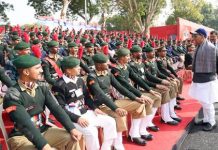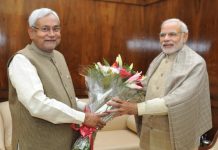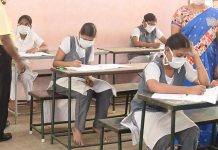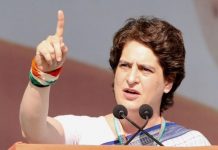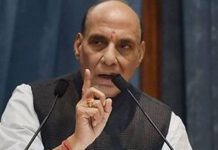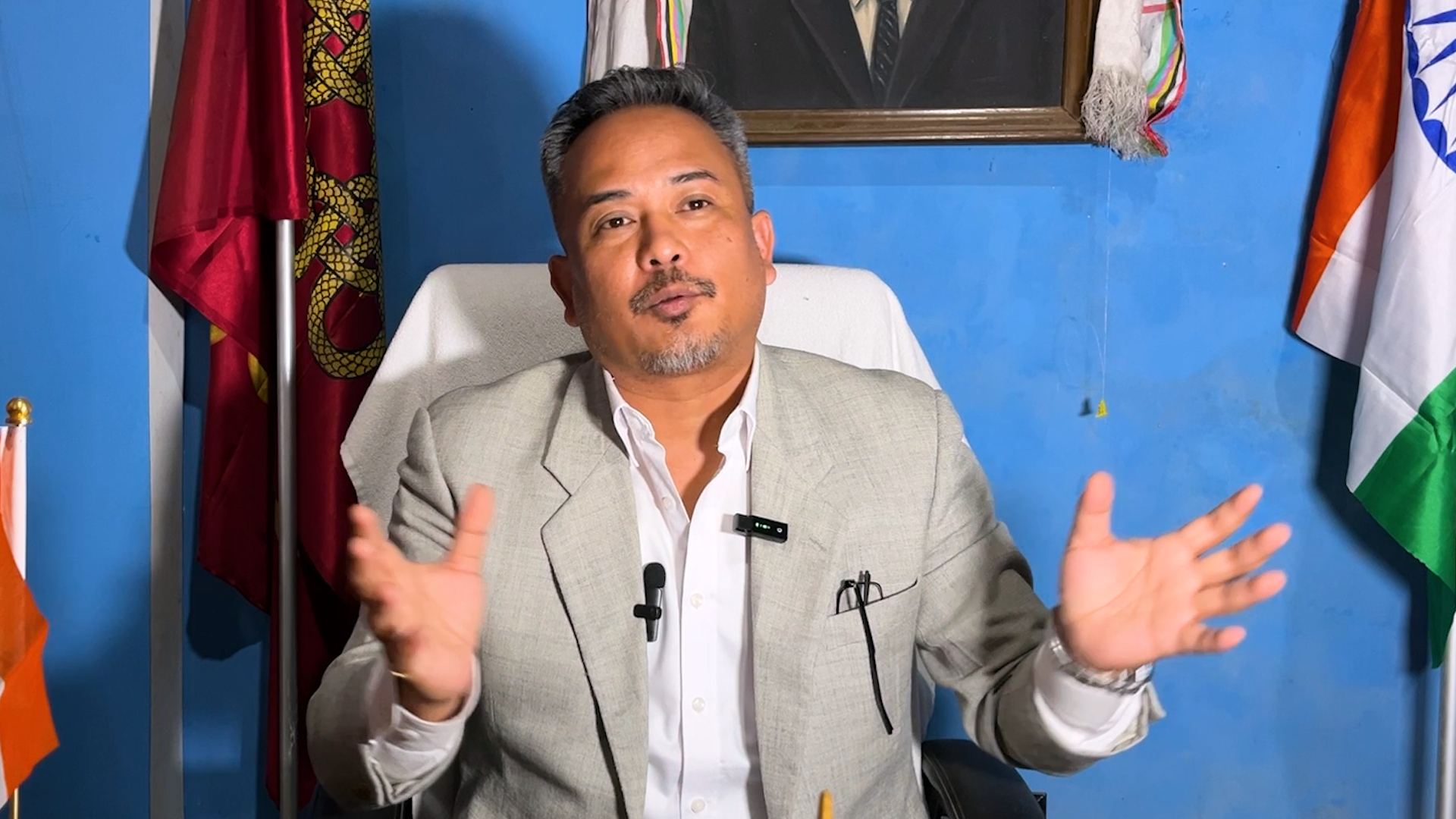
With the elections looming large in Manipur, the political landscape is bustling with campaign activities. The upcoming polls for the Inner Manipur seat are scheduled for April 19, while the Outer Manipur Parliamentary constituency will witness elections on April 26. R.K. Somendro, popularly known as Kaiku, is gearing up as an independent candidate backed by the Manipur People’s Party. He faces a formidable lineup in the Inner Manipur parliamentary constituency, competing against BJP’s Thounaojam Basantakumar, Congress’s Angomcha Bimol Akoijam, Maheshwar Thounaojam from the Republican Party of India (Athawale), and two other Independent candidates – Moirangthem Tomtomsana Nongshaba and Haorungbam Sarat.
Having earned acclaim as an actor in Manipuri films, RK Somendro recently sat down for an interview with Tehelka.com. In this interview, he sheds light on his vision for Manipur, the driving force behind his entry into politics, his recent departure from the Bharatiya Janata Party, and his contributions to society.
Q: You achieved fame and success as a renowned Manipuri film actor in the past. What motivated you to transition into the realm of politics?
A: If I hadn’t pursued acting, I doubt I would have ventured into politics. My inclination towards public service stems from my experiences as an actor. Travelling extensively across Manipur and its hill regions for filming exposed me to the harsh realities faced by many. I witnessed firsthand the struggles of hill-dwellers, especially children, who endure immense hardships just to obtain water. Trekking rugged terrains from 11 am to 4 pm with bamboo baskets to fetch water, only to discover their toil when we casually used it for bathing, was eye-opening. This wasn’t isolated; it mirrored the broader challenges faced by villagers throughout Manipur.
Despite governmental claims of welfare initiatives in newspapers and on TV, these benefits often failed to reach those most in need. The marginalized, uneducated, and fearful of authority suffered silently. It’s these very people who contributed to my journey as an actor. In return, I feel compelled to give back, prompting my decision to enter politics.
Unlike wealthier actors like Shah Rukh Khan or Salman Khan, I lack the financial means to provide widespread assistance without entering politics. Manipuri actors like myself lack such vast resources. Therefore, I see politics as a platform to ensure justice by ensuring that government schemes and aid genuinely reach the people. My aim is to advocate for the neglected hill and valley communities, driving my choice to step into politics.
Q: Having been a member of the Bharatiya Janata Party (BJP) previously and now vying to contest the Lok Sabha Election 2024 from the Manipur People’s Party (MPP), and currently as an independent candidate, the question arises: Is there a pressing need for a regional party in Manipur?
A: After initially aligning myself with the Lok Janshakti Party (LJP) led by Ram Vilas Paswan, I found myself at a crossroads during the election period. While I was an active participant in LJP’s campaign efforts for the previous general election, the party’s alliance with the Bharatiya Janata Party (BJP) brought about unexpected challenges. As election time approached, indications surfaced that the LJP preferred that I refrain from contesting.
Though they didn’t explicitly instruct me, I gathered information suggesting they wouldn’t support my candidacy under the LJP banner. Despite tempting offers, I chose to decline and remain committed to my principles. At that critical moment, my dedication to serving the public prompted me to declare my candidacy independently, knowing that stepping back would have sent the wrong message to my supporters.
Although victory wasn’t secured in that election, I received significant support and garnered numerous votes without resorting to buying votes or distributing money. Challenges like the absence of adequate campaign infrastructure limited my vote count to around 82,000, yet the overwhelming support I received reinforced my belief in prioritizing public service over political affiliations.
I feel compelled to be candid about my political journey. Subsequently, I received an invitation to join the Bharatiya Janata Party (BJP) and observed several commendable initiatives undertaken by the party. Numerous central leaders demonstrated genuine concern for Manipur, instilling in me the belief that joining the BJP would enable me to contribute meaningfully to my dream for Manipur’s development.
However, the unfolding unrest in Manipur since May 2023 shattered my initial optimism. Despite anticipating a swift resolution, the situation persisted for months without adequate attention or action from BJP leaders. This disappointment eroded my trust in the party, leading me to resign and commit myself to independent public service.
As the Lok Sabha 2024 election approached, I received several offers from national parties. Yet, I recognized a crucial need for the people of Manipur to reclaim agency and address their own challenges. It dawned on me that excessive reliance on national parties had contributed to Manipur’s current crisis. This realization underscored the necessity for a strong regional party. Given its longstanding presence, I opted to align with the Manipur People’s Party (MPP), the second oldest regional party in India.
Unfortunately, delays in the Election Commission of India uploading the MPP’s documents prevented me from contesting on their ticket. Nonetheless, I am grateful for their support and will proceed as an independent candidate, driven by a steadfast commitment to serve the people of Manipur.
Q: The film and entertainment industry in Manipur has been profoundly impacted by the ongoing unrest. Actors, singers, and performers, including those involved in Sumang Leela, are facing immense challenges in earning a livelihood due to the prevailing circumstances. What are your thoughts on this concerning situation?
A: It’s not just limited to the film and entertainment sectors; many sportspeople in Manipur are also facing significant struggles. The government and its dedicated departments have often fallen short in providing support to these athletes during their times of need. It’s disheartening to see that support is often only extended when they achieve notable feats, such as winning gold medals, while they receive minimal assistance during their periods of struggle and training. Consequently, numerous talented individuals find themselves unable to participate actively in their sports.
Turning back to the film and entertainment industry, Manipuri films have made remarkable strides and contributed significantly to the cultural landscape of Manipur. Art and culture are integral to the identity of Manipur, and these films often achieve impressive results despite modest budgets. In fact, many filmmakers from outside the state have studied Manipuri films to understand their innovative production techniques on a limited budget.
Even when filmmakers from Mumbai visited Manipur and witnessed film shootings, they were astonished by the quality of output achieved with limited resources. While the public enjoys these artistic products, there seems to be a disparity in the recognition and respect accorded to entertainers and artists. It’s essential to remember that respecting art and culture is a reflection of how we value ourselves as a society. I hope that people continue to acknowledge and appreciate the immense contributions made by the film and cultural sectors in Manipur.
Q: What were your experiences while visiting various locations across the state during the ongoing conflict between the Meitei and Kuki communities, and do you see any prospects for reconciliation and revival?
A: During my visits to various places, I witnessed numerous heart-wrenching incidents and the dire conditions faced by many people. There were moments when I nearly fainted from the overwhelming emotions. In the early stages of the violence in Manipur, I encountered many individuals, especially children, in relief camps who lacked basic necessities like footwear and adequate clothing. The harsh winter added to their suffering, as they slept on the cold ground or on straw-filled mattresses. Even in our own homes, the bitter cold made it challenging to find comfort, yet many elders like my parents endured sleeping without proper bedding in relief camps.
However, what struck me the most was the resilience and solidarity of the people of Manipur. Despite their own hardships, everyone came together to support each other with monetary contributions or essential supplies for those displaced by the violence, particularly in the relief camps. While the government also provided assistance, I must commend the people for their immense efforts during these trying times. Their collective contributions far surpassed what the government could offer.
Additionally, numerous young people volunteered as village defense volunteers to safeguard Manipur, demonstrating remarkable courage and resilience against the elements for many months. This volunteerism wasn’t restricted to the youth; even the elderly joined in, enduring harsh weather conditions to protect lives and properties. Witnessing their dedication, I couldn’t help but wonder how long this collective effort could be sustained. In response, I personally visited various locations and contributed whatever assistance I could.
However, I faced criticism from some quarters, with accusations that my contributions were solely motivated by the upcoming election. This unjust criticism deeply disheartened me, especially considering that earlier, these very individuals had praised my efforts. Despite representing the inner Manipur parliamentary constituency, I extended my support to areas like Sugnu and Kakching, which aren’t directly under my electoral jurisdiction. This, I believe, demonstrates my genuine concern for the welfare of all Manipuris, not just those within my constituency.
I want to clarify that during times of conflict, campaigning for votes was not even a consideration. My actions were driven purely by a desire to help people in need. It’s disheartening to see that some candidates may not feel the need to understand ground realities and instead opt for superficial actions during election periods. I firmly believe that a candidate’s duty is to comprehend the actual challenges faced by the people and work tirelessly to address them, ultimately contributing to the development and prosperity of the state.
Q. Do you believe that the prolonged conflict situation in Manipur has prompted the people to prioritize voting for the right candidate over succumbing to cash or alcohol for votes? Has this ongoing issue served as a wake-up call for the people of Manipur?
A: I wouldn’t go so far as to say that the current issue has completely awakened the people of Manipur, but it certainly should have prompted awakening. With elections approaching, there seems to be a temporary calm, and many seem to have forgotten the immense suffering endured over the last ten months. Only those residing in relief camps or mourning the loss of loved ones continue to bear the weight of this tragedy.
Unfortunately, the election fervor has overshadowed the gravity of what transpired, with many appearing to brush aside the pain and trauma as if it never happened. This reality pains me to admit, and as a politician, it may cost me votes, but I refuse to compromise the truth. I cherish the people of Manipur deeply, and it’s crucial to convey the reality, regardless of the consequences.
If we fail to act decisively now, future generations will inherit our mistakes. Our ancestors’ failures led us to this plight, and it’s imperative that we think and act with clarity. I am driven by a sincere desire to effect positive change, even though the current political landscape often seems mired in deception and neglect of those advocating for real change. Politics, at its core, is meant to serve and uplift people, and it’s vital for the public to comprehend the gravity of the situation and respond accordingly.
Q. Did a specific incident during this conflict deeply resonate with you and compel you to intensify your dedication and efforts to work for the people of Manipur more passionately than ever before?
A: There were several incidents that deeply affected me during this conflict. One such incident involved the members of Arambai Tenggol, whose capture and subsequent killing struck me emotionally. However, the incident that ultimately led me to part ways with the BJP was the tragic fate of Linthoingambi and Hemanjit. Both of them were like family to me, akin to my own son and daughter.
The sight of Linthoingambi, wearing a mask and looking into the camera with masked eyes, was profoundly emotional. On the day of this incident, I was scheduled to deliver a speech at a meeting, but I found myself unable to speak as I was overwhelmed with grief. As a father of four daughters, I couldn’t help but imagine what I would do if a similar tragedy befell one of my own children. Should I remain silent simply because the incident didn’t directly affect my family?
This realization prompted me to take a decisive stand. I couldn’t ignore the suffering of others simply because it didn’t touch my immediate circle. The ordeal faced by Linthoingambi and Hemanjit could happen to anyone, and this realization fueled my decision to leave the BJP and work independently, focusing on providing assistance and support to the people in need.
Q: As a candidate in the upcoming 2024 election, what vision and plans do you have in store for the people of Manipur?
A: I believe in speaking only the truth, even if it means being straightforward and practical about our challenges. Many political parties release elaborate manifestos during elections, and candidates make numerous promises. However, how many of these promises actually materialize? It’s concerning that the public rarely holds politicians accountable for unfulfilled promises.
The core issue lies in the fact that there’s a lot of talk during elections, but once the voting is done, everything seems to quiet down. I refuse to engage in this cycle of making false promises to garner votes. If elected, I will do my utmost to deliver on what I can realistically achieve.
Let’s face reality: can I, as an MP, single-handedly resolve the ongoing issues in Manipur? Can any MP do so? The reality is that such complex issues require the attention and action of central leaders. Unfortunately, our voices as Manipur MPs often go unheard in parliament. While leaders from other states and parties have raised these issues both nationally and internationally, the impact has been limited.
Bringing Scheduled Tribe status to Manipur is another critical issue that cannot be tackled by an MP alone. It involves a systematic process that begins with recommendations from the state assembly. All communities in Manipur must come together, like brothers and sisters, to address misunderstandings and resolve the issue collectively. It’s essential to recognize that communities in Manipur share mutual respect and love, and by working together, we can pave the way for meaningful change, including the passage of the ST bill.
In essence, my approach is grounded in practicality and honesty. I won’t promise what I can’t deliver, and I believe in working collaboratively with all stakeholders to address our challenges effectively.
Q: How would you articulate your appeal to the people of Manipur regarding the upcoming Lok Sabha election?
A: My appeal to the public as a candidate is rooted in my past experiences. During my last election, I had the privilege of meeting women and elders from various parts of Manipur. However, due to current circumstances, I have not been able to conduct an extensive campaign to urge people to vote for me. I humbly request everyone not to harbor any ill will because of my inability to personally visit your homes and engage in discussions.
Everything I have done over the years has been for the betterment of our motherland and its people. I have always acted in the best interests of the public and have never misled anyone. I ask for your support and the opportunity to serve as a Member of Parliament.
Beyond the election, safeguarding Manipur is a collective responsibility that falls on every citizen of our state. It is imperative for all communities to come together and engage in dialogue to address our shared challenges. The suffering extends across all communities – Meitei, Kuki, Naga, Meitei Pangal, and others. This is our Manipur, and it is our duty to protect it. Let us unite to preserve the beauty and integrity of our beloved state.


